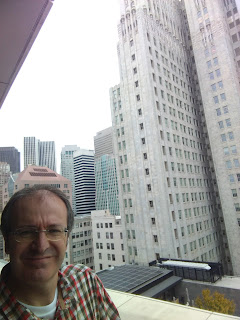I was granted by the Center for Basque Studies this time, Begoña Aretxaga scholarship has been given to me to spend the whole November and the half of December.
The second work day at the center and the 50th anniversary shows up! That is good. Former professors and employee came up to share a couple of ours listening to few words given by Bill Douglas, the President of the UNR, the director Xabier Irujo and the co-director Sandra Ott. Also, a couple of bertsos were sung by Jesus Goñi, the bertsolari of Reno (well, in fact, he was born in Oronoz Mugaire, but he has been living in the States for more than 50 years).
Some other visitors like me, as for example, Rakel Ezpeleta and relatives of the staff were attending this event. It was fun.
The second week was fun too. We had the visit of a great musician from the Basque Country: Josu Okinena, He gave us a spectacular concert with works by Father Donostia. It is an activity called "Xuxuxrla" (whisper) within a project of international concerts to give to spread the work of Aita Donostia.
Then we went to Silver Legacy casino to have some "refreshments".
That same week in Reno the Basque center of the city, Zazpiak Bat, celebrated San Martin Eguna, with a dinner, a raffle, music and a little dance.
That same weekend I went to San Francisco. Here I am on a balcony of the Moma Art Museum.
The following week we had the visit of Dr. Jon Reyhner, Professor of Education and coordinator for the bilingual multicultural education program at Northern Arizona University.

His interesting and passionate lecture was focused on the importance of revitalizing Indigenous languages in the United States. Later we were also in the casino, with his wife (of the Navajo ethnic group).In the photo, they do not appear, but we do appear: the "quartet" of November.
Here is the professor giving his lecture.
That week was celebrated on Thanksgiving day in the USA. I was lucky to experience how it is celebrated in the Irujo's house. Spectacular dinner with traditional turkey and other amenities.
While I was in my last weeks of my stying Eusko Ikaskuntza or The Society of Basque Studies wranted with ENE price the CBS: here the announcement:
"Today we are proud to announce that the William A. Douglass Center for Basque Studies and the Jon Bilbao Basque Library have been awarded the Euskararen Nazioarteko Eguna Saria (Euskara International Day award) by Eusko Ikaskuntza-Basque Studies Society.
In its remarks, the jury stressed their hard work done during the last 50 years to increase the awareness of the Basque language and culture in the North American academia.
The staff of the Center and the Basque Library would like to extend our gratitude to Eusko Ikaskuntza. This award will motivate us to continue our work for another 50 years and beyond."
With Marie Louis Lecumberry, owner of J T Basque Restaurant in Gardnerville and Iñaki Arrieta, Main librarian of the CBS. We were visiting the exhibition about "Reinventing Basque Identity" at UNR, organized by professor Anita Watson (Shared History Program).
Yesterday's lecture about "America in Basque Literature" at Basque Conference Room.
Atzoko hitzalditxoa, "America in Basque Literature".
Here it is the piece of news taken from the CBS's blog about my lecture:
What kinds of representations and discourses emerge in Basque literature about America and Basque Americans?
On December 7, Asier Barandiaran gave a talk at the CBS Seminar Series about the Basque diaspora in America through Basque literature. Asier has visited the Center for the fifth time in order to work and use the Basque library collection for his research purposes. Asier is Associate Professor at the Department of Education and Sport at the University of the Basque Country (EHU-UPV). He is also affiliated with the Department of Language and Literature and serves as vice president of the Basque Studies Society (Eusko Ikaskuntza).
Asier’s lecture departed from the presumption that literature does not only create texts but wider representations and discourses as well. What kinds of representations and discourses emerge in Basque literature about America, and Basque Americans? Asier made three distinctions in this regard: Basques traveling to the US, Basques living in the US, and Basque diaspora and identity maintenance in the diaspora. From improvisational poetry (bertsolaritza) to novels, a host of Basque authors have contributed to the creation of a particularly Basque imaginary in the American context: the sorrows of immigration and leaving one`s home; reminiscences about childhood and nature; the difficulties of settlement (including obtaining visas); the lonely life of sheepherders; an assortment of indigenous animals exotic to the Basque imagination; the Basque language, and the California sun have equally entered Basque literature. Eskerrik asko, Asier!
Amaia Iraizoz, nafar prestua graduatua jada, Center for Basque Studies-eko photo-callean
Amaia Iraizoz recently graduated. It is amazing the deep and rigorous work that she has done in four years (about the return of the Navarrese emigrants). She only has left to do the defense of the thesis and we already have a new doctor. Proud of her.























